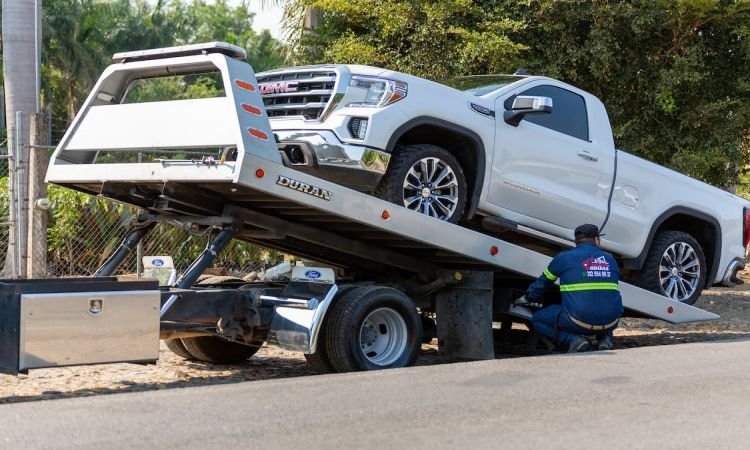 Towing a trailer is already a task that requires skill, attention, and preparation. Throw in some bad weather, and you’ve got yourself a real challenge. Whether it’s heavy rain, snow, or high winds, bad weather conditions can make towing a trailer a risky endeavor. However, sometimes, you don’t have the luxury of waiting for the skies to clear. In such cases, knowing how to tow your trailer safely becomes crucial. This comprehensive guide will walk you through ten essential tips for towing a trailer in bad weather, ensuring both your safety and that of other road users.
Towing a trailer is already a task that requires skill, attention, and preparation. Throw in some bad weather, and you’ve got yourself a real challenge. Whether it’s heavy rain, snow, or high winds, bad weather conditions can make towing a trailer a risky endeavor. However, sometimes, you don’t have the luxury of waiting for the skies to clear. In such cases, knowing how to tow your trailer safely becomes crucial. This comprehensive guide will walk you through ten essential tips for towing a trailer in bad weather, ensuring both your safety and that of other road users.
But let’s not forget bad weather doesn’t just mean rain or snow; it can also include fog, strong winds, and even hail. Each type of weather condition presents its own set of challenges, and being prepared for all possibilities is your best bet for a safe journey. So, whether you’re a seasoned pro at towing or a complete novice, these tips are designed to equip you with the knowledge you need to navigate through any weather condition you might encounter.
1. Check Weather Forecasts
Before you even hitch your trailer, it’s crucial to check the weather forecast for your route. Knowing what to expect will help you prepare adequately. If severe weather is predicted, consider postponing your trip. However, if that’s not an option, make sure you’re prepared for the conditions you’ll face. Keep an eye on weather updates as you go, and don’t hesitate to pull over if conditions worsen. Remember, it’s always better to arrive late than never to arrive at all. And if you’re caught in unexpected bad weather, knowing the forecast can help you decide whether to push through or seek shelter.
2. Adjust Your Speed
When towing a trailer in bad weather, speed is your enemy. The faster you go, the less control you’ll have, especially on wet or icy roads. Reduce your speed and increase your following distance to give yourself more time to react to obstacles or sudden stops. Remember, it’s not a race. Your primary goal is to reach your destination safely, even if it takes a little longer. And let’s be honest, no cargo is worth risking your life or the lives of others on the road.
You can also hire a towing service if you find yourself in a situation where it’s too risky or challenging to tow the trailer yourself. Professional towing services have the experience and equipment to handle difficult weather conditions, ensuring that your trailer reaches its destination safely. This option can be particularly useful if you’re caught in a sudden storm or if the trailer is carrying valuable or fragile cargo. While there’s a cost involved, the peace of mind and added safety can make it a worthwhile investment. So, if you’re ever in doubt about your ability to tow a trailer safely in bad weather, don’t hesitate to seek professional help.
3. Inspection Is Necessary
Before hitting the road, give your trailer and towing vehicle a thorough inspection. Check the tires, brakes, lights, and other essential systems. Make sure the trailer hitch is secure and that all electrical connections are in working order. In bad weather, even a minor issue can become a significant problem, so don’t skip this step. A well-maintained vehicle and trailer are your first line of defense against the challenges posed by bad weather. And remember, a quick inspection before you start can save you from a potential disaster down the road.
4. Use Your Lights and Signals
Visibility is often reduced in bad weather, making it essential to use your lights and signals effectively. Turn on your headlights, even during the day, to make yourself more visible to other drivers. Use your turn signals well in advance of making a turn or changing lanes. Proper communication with other road users can significantly reduce the risk of accidents. And in conditions like fog or heavy rain, your lights and signals are often the only way other drivers can see you.
5. Avoid Sudden Movements
Sudden movements can be dangerous when towing a trailer, especially in bad weather. Avoid quick turns, sudden stops, or rapid acceleration. Smooth, controlled movements will help you maintain better control of your vehicle and trailer, reducing the risk of skidding or jackknifing. This is especially important in conditions like ice or snow, where your traction is already compromised.
6. Plan Your Route
When you’re towing a trailer in bad weather, the route you take can make a significant difference. Avoid roads that are prone to flooding or that are particularly winding or steep. Use a GPS or mapping app to find the most straightforward and safest route to your destination. Sometimes, the longer route is actually the safer route when bad weather is involved. And always have a backup route in mind, just in case your primary route becomes impassable.
7. Keep Emergency Supplies
Always keep an emergency kit in your vehicle, especially when towing a trailer in bad weather. Your kit should include items like water, non-perishable food, blankets, a first-aid kit, and essential tools. Also, make sure you have a fully charged phone and a way to charge it, like a car charger or portable battery. You never know when you might need it. In extreme weather conditions, this kit could literally be a lifesaver.
8. Know When to Pull Over
Sometimes, the best thing to do in bad weather is to pull over and wait it out. If conditions become too dangerous, find a safe place to park your vehicle and trailer. Turn on your hazard lights and wait for conditions to improve. It’s better to lose some time than to risk an accident. And if you’re in a location where the weather is rapidly changing, sometimes waiting just a few minutes can make all the difference.
9. Get Professional Training
If you’re new to towing trailers, consider taking a professional towing course. These courses teach you the skills you need to tow safely, and they often include specific tips for handling bad weather conditions. The knowledge you gain could be invaluable, especially when you find yourself caught in a storm. Plus, some insurance companies offer discounts if you’ve completed a certified towing course, so it’s a win-win situation.
10. Double-Check Insurance and Paperwork
Before you set out, make sure all your paperwork is in order. Check that your insurance covers towing in adverse weather conditions and that you have all necessary permits. Keep all your documents in an easily accessible but secure location. In the event of an accident or other emergency, having your paperwork readily available can save you a lot of hassle.
Conclusion
Towing a trailer in bad weather is not something to take lightly. It requires preparation, caution, and a good deal of skill. By following these tips, you can significantly reduce the risks involved and ensure that you, your trailer, and everyone else on the road stay safe. So the next time you find yourself needing to tow a trailer in less-than-ideal conditions, remember: safety first, always. And with these tips in your towing toolkit, you’ll be well-equipped to handle whatever Mother Nature throws your way.




